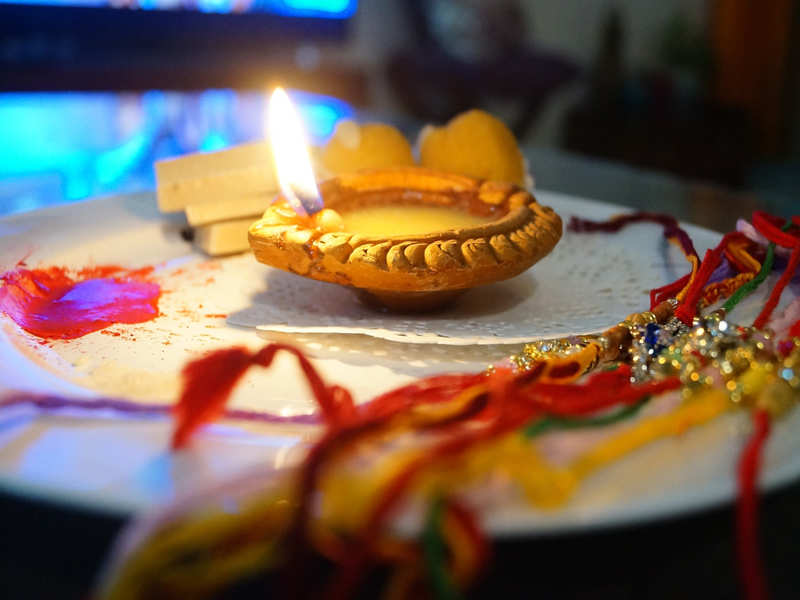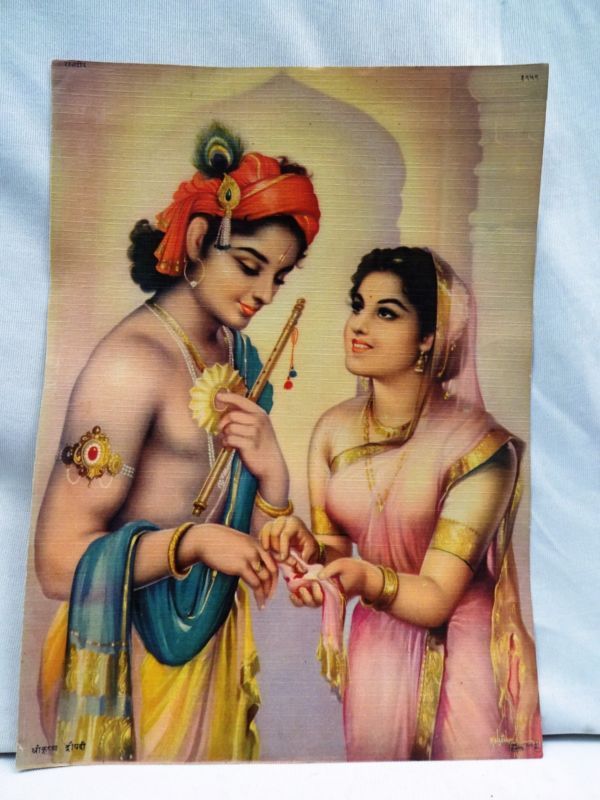Rākhī derives from the Sanskrit rakṣikā, a join: rakṣā protection.
Raksha Bandhan is observed on the last day of the Hindu lunar calendar month of Shraavana, which typically falls in August. The expression “Raksha Bandhan,” Sanskrit, literally, “the bond of protection, obligation, or care,” is now principally applied to this ritual.
Until the mid-20th-century, the expression was more commonly applied to a similar ritual, also held on the same day, with precedence in ancient Hindu texts, in which a domestic priest ties amulets, charms, or threads on the wrists of his patrons, or changes their sacred thread, and receives gifts of money; in some places, this is still the case.

The sister-brother festival, with origins in folk culture, had names which varied with location, with some rendered as Saluno, Silono,and Rakri. A ritual associated with Saluno included the sisters placing shoots of barley behind the ears of their brothers.
Contrary to popular belief, Rakshabandhan did not originate during Mughal times.
According to the Bhaviṣya Purāṇa, Shri Krishna, in a long narration to Yudhiṣṭhira, speaks about रक्षाबन्धन and it’s significance.
This chapter is called रक्षाबन्धनवर्णनम्.
Krishna says
“Listen to me carefully as I describe the ceremony of Baliraksha.”
“In the days of yore, there was a battle between Devas and Asuras. Asuras were defeated in this battle .
These asuras, with Bali as their chief, reached the abode of their Guru Shukracharya.
Shukracharya told the Asuras…
“Do not despair. This is destiny. Victory & loss is bound to time. You must call a truce with the Indra. For one year, Indra is invincible.”
“This is because Shachi(wife of Indra) tied a Rakshabandha to Indra. Wait for a year and you will be successful.”
Because this thread protected(gave raksha) to Indra from Bali, it was called “Baliraksha”.
Yudhiṣṭhira then asks Krishna about the Vidhi and Vidhana of observing Rakshabandhan.
Krishna replies…
“The season of cloudy sky and green earth is Shravana. On the Purnima of Shravana, one should bathe and perform rituals according to the Vidhana of shruti and smriti.”
Krishna continues…
“One must then observe upakarma and offer tarpana to Rishis and ancestors and perform other Śrāddha rites. Shudras too have to perform mantrasahita snānas and dānas.”
“Then in the afternoon one must make a thread out of golden/shiny cloth and place it on a Peetha. The Purohita must tie the raksha thread to the king who would be seated along with his companions.”
When he ties the Raksha thread, Purohita has to utter the following mantra –
येन बद्धो बलीराजा दानवेन्द्रो महाबलः।
तेन त्वाम् अभिबध्नामि रक्षे मा चल मा चल॥
“Just as powerful Danava king Bali was tied , I similarly bind you, O raksha thread. Dont slip away.”

The tradition has continued to this day, albeit in another form. The brother-sister relationship was brought to the fore. However, rakshabandhan can be observed by anyone – as long as they have the trust that the other will help them and take care of them in time of need.
In urban India, where families are increasingly nuclear, and marriages not always traditional, the festival has become more symbolic, but continues to be highly popular. The rituals associated with these rites, however, have spread beyond their traditional regions and have been transformed through technology and migration. According to anthropologist, Leo Coleman:
In modern rakhi, technologically mediated and performed with manufactured charms, migrating men are the medium by which the village women interact, vertically, with the cosmopolitan center—the site of radio broadcasts, and the source of technological goods and national solidarity.
Hindi movies have played a salient role. According to author Vaijayanti Pandit,
Raksha Bandhan traditionally celebrated in North India has acquired greater importance due to Hindi films. Lightweight and decorative rakhis, which are easy to post, are needed in large quantities by the market to cater to brothers and sisters living in different parts of the country or abroad.
More social interaction among India’s population has played a role in the increased celebration of this festival. According to author Renuka Khandekar:
But since independence and the gradual opening up of Indian society, Raksha Bandhan as celebrated in North India has won the affection of many South Indian families. For this festival has the peculiar charm of renewing sibling bonds.
रक्षाबंधन की आपको बहुत बहुत शुभकामनाएँ!
Such a beautiful thought, celebrating relationships! Happy Rakshābandhan:)
रक्षाबन्धनवर्णनम्
।। श्रीकृष्ण उवाच ।। ।।
अथातः संप्रवक्ष्यामि बलिरक्षाविधिं नृप ।।
तं शृण्वेकाग्रमनसा समासाद्गदितं मया ।। १ ।।
पुरा देवासुरे युद्धे दानवा सुरनिर्जिताः ।।
शुक्रं बलिं पुरः कृत्वा ययुः शुक्र उवाच तम् ।।२।।
।। शक्र उवाच ।। ।।
न विषादस्त्वया कार्यः कार्याणां गतिरीदृशी।।
दैवाद्भवंति भूतानां काले जयपराजयाः।। ३ ।।
संधानं सह शक्रेण क्रियतामयनद्वयम ।।
अजेयः सर्वशत्रूणां कृतः शच्या शचीपतिः।। ४ ।।
रक्षाबंधप्रभावेन दानवेन्द्रो जितो महान् ।।
वर्षमेकं प्रतीक्षस्व ततः श्रेयो भविष्यति ।। ५ ।।
भार्गवेणैवमुक्तास्ते दानवा विगतज्वराः ।।
तस्थुः कालं प्रतीक्षन्तो यथोक्तं गुरुणा तथा ।।६।।
एष प्रभावो रक्षायाः कथितस्ते युधिष्ठिर ।।
जयदः सुखदश्चैव पुत्रारोग्यधनप्रदः ।।७।।
।। युधिष्ठिर उवाच ।। ।।
क्रियते केन विधिना रक्षाबंधः सुरोत्तम ।।
कस्यां तिथौ कदा देव एतन्मे वक्तुमर्हसि ।। ८ ।।
यथा यथा हि भगवान्विचित्राणि प्रभाषते ।।
तथा तथा न मे तृप्तिर्बह्वर्थाः शृण्वतः कथाः ।। ९ ।।
।। श्रीकृष्ण उवाच ।। ।।
घनावृतेऽम्बरे पार्थ शाद्वले धरणीतले ।।
संप्राप्ते श्रावणे चैव पौर्णमास्यां दिनोदये ।। 4.137.१० ।।
स्नानं कुर्वीत मतिमाञ्श्रुतिस्मृतिविधानत ।।
ततो देवान्पितॄंश्चैव तर्पयेत्परमांभसा ।। ११ ।।
उपाकर्मादिवेदोक्तमृषीणां चैव तर्पणम् ।।
कुर्युश्च ब्राह्मणाः श्राद्धं देवमुद्दिश्य शक्तितः ।। १२ ।।
शूद्राणां मंत्रसहितं स्नानं दानं च शस्यते ।। १३ ।।
ततोपराह्नसमये रक्षापोटलिकाः शुभाः ।।
कारयेच्चाक्षतैः शस्तैः सिद्धार्थैर्हेमभूषिताः ।। १४ ।।
वस्त्रैर्विचित्रैः कार्पासैः क्षौमैर्वा मलवर्जितैः ।।
विचित्रतरैर्ग्रथिताः स्थापयेद्भा जनोपरि ।। १५ ।।
कार्या गृहस्य रक्षा गोमयरहितैः सुवृत्तकुंडूकैः ।।
दूर्वावर्णकसहितैः सकलदुष्कृतोपशांतये ।। १६ ।।
उपलिप्तगृहमध्ये चतुष्कोपरि न्यसेच्छुभं पीठम् ।।
तत्रोपविशेद्राजा सामात्यः सपुरोहितः ससुहृत् ।। १७ ।।
वेश्याजनेनसहितो मंगलशब्दैः सुहसितैश्चिह्नैः।।
रक्षाबंधः कार्यः शांतिध्वनिना नरेन्द्रस्य।।१८।।
देवद्विजातिशस्ता सुस्त्रीरर्घ्यैः समर्चयेत्प्रथमम्।।
तदनु पुरोधा नृपतिं रक्षां बध्नीत मंत्रेण।।१९।।
येन बद्धो बली राजा दानवेन्द्रो महाबलः ।
तेन त्वामभिबध्नामि रक्षे मा चल मा चल । । 4.137.२०
ब्राह्मणैः क्षत्रियैर्वैश्यैः शूद्रैश्चान्यैश्च मानवैः ।
कर्तव्यो रक्षिकाबन्धो द्विजान्सम्पूज्य भक्तितः । । २१
अनेन विधिना यस्तु रक्षिकाबन्धमाचरेत् ।
स सर्वदोषरहितः सुखी सम्वत्सरं भवेत् । । २२
यः श्रावणे स्रवति शीतजले नरेन्द्र रक्षाविधानविधिमाचरते मनुष्यः ।
आस्ते सुखेन परमेण च सर्वमेकः पुत्रप्रपौत्रसहितः ससुहृद्वृतश्च । । २३
इति श्रीभविष्ये महापुराण उत्तरपर्वणि श्रीकृष्णयुधिष्ठिरसंवादे श्रावणपूर्णिमारक्षाबन्धनविधिवर्णनं नाम सप्तत्रिंशदधिकशततमोऽध्यायः । १३७
